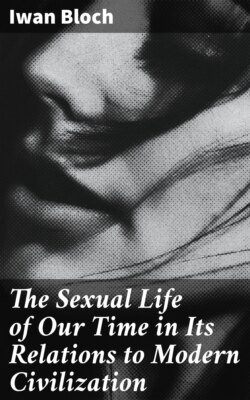Читать книгу The Sexual Life of Our Time in Its Relations to Modern Civilization - Iwan 1872-1922 Bloch - Страница 38
На сайте Литреса книга снята с продажи.
CHAPTER VIII
ОглавлениеTable of Contents
The individualization of love is principally a product of recent times. A talented author, H. T. Finck, has dealt with this fact in a comprehensive work in two volumes.[134] This individual love, containing the spiritual elements of all the successive epochs of civilization, he denotes by the term “romantic” love, whereas we ourselves generally understand by that term a special variety of the more comprehensive individual love.
Every one who is interested in the numerous “overtones” of individual love will find in Finck’s book a rich, though not very well arranged, supply of material.
Independently of Finck, I shall endeavour in this chapter to describe very briefly the most important elements and the developmental phases of modern love.
First, however, let us consider the “idealization of the senses,” this expression being used by Georg Hirth to denote the capacity of the senses for self-government; for independent feelings of pleasure and pain; for the development of peculiar imaginations, ideas, and talents; and for the utilization at will of other sensory areas and foci of impulse—indeed, of the entire individual—for the purposes of purely sensual self-command. The lower senses, among which Hirth also reckons the sexual impulse, can only be idealized in consequence of the centripetal spontaneous activity of the higher senses.[135]
This artistic idealization of the senses and impulses also plays an important part in the process of the individualization and spiritualization of love. The sexual impulse becomes “the source of rich joys and imaginative tragedy” by means of the “veil of imagination,” the “heaping up of emotions,” and the “helmet of reason” (Hirth). The libido sexualis also takes part in the idealization of all the human senses and impulses. This is the indispensable preliminary and foundation of the transformation of the sexual impulse into love.
The first important enrichment of the sexual inclinations by means of a higher spiritual, individual element, which continues to-day to form a constituent of modern love, is, I consider, the Platonism of Greek antiquity and of the Italian renascence. It is a metaphysic of love resting upon the individual, æsthetic contemplation of the beloved personality.[136] For that is the true sense of “Platonic love.” It ennobles physical love to the heavenly Eros, which is nothing else than the idea of beauty in the highest sense of the word. Kuno Fischer, in his first published writing, “Diotima” (Pforzheim, 1849), has erected a beautiful monument in honour of this Platonic love. And did not the immortal Darwin restate the thought of Plato, when he described beauty as the testimony of love? In Platonism, at any rate, is to be found the first intimation of a higher individual significance of love. In Dante’s Beatrice, in Petrarch’s Platonic lyrics, this idea is reillumined after the long night of the middle ages, to shine forth still more clearly at the time of the renascence in the new Platonism and in the cult of the beautiful, thus attaining a much more powerful individual colouring than it had among the Greeks.
In the sphere of love, as elsewhere, the plastic genius of the Greeks manifested itself in the form of peaceful æsthetic contemplation; romantic individualism, on the other hand, was foreign to the Greek mind. The latter is a modern sentiment. Jean Paul, in his “Vorschule der Aesthetik” (Hamburg, 1804, vol. i., p. 139), has aptly characterized the difference between antique and modern sensibility in the words: “The plastic sun (of the ancients) illuminates universally, like waking; the romantic moon (of the moderns) gleams fitfully, like dreams.”
These first traces of romantic-individual love may be detected already in Christian medievalism, among the troubadours and the minnesinger. The heartfelt song, “Thou art mine, I am thine,” gives the clearest expression to the individual, purely personal nature of the love-relations between man and woman, and discloses also the “romantic” sentiment, as in “Thou art locked within my heart; lost is the key: now must thou stay there for ever,” and discloses the intimate association peculiar to romanticism between the nature-sense and the feeling of love. It is the beloved who first fills for us the joy of summer; her love is like the rose. An enormous range is thus opened to the subjectivity of this sentiment. The romanticism of the secret element in love is first perceived at this time, and finds perception in the words:
